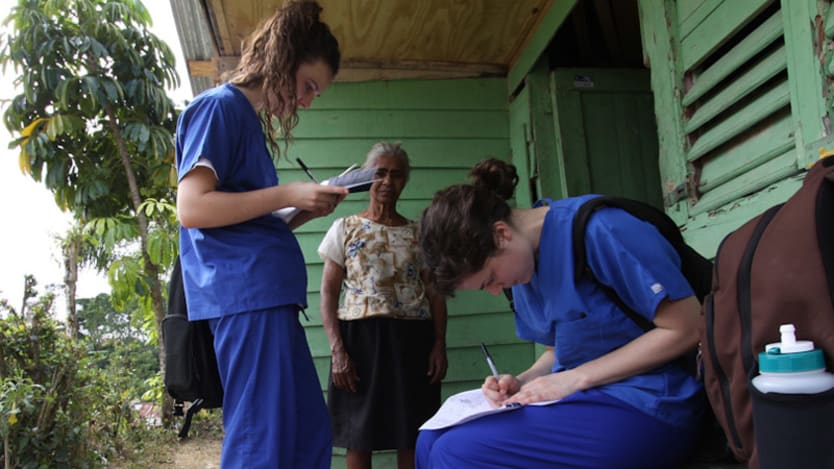
We’ve just arrived in Addis Ababa, Ethiopia, for the final step in our journey that culminates this week with an agreement for Financing for Development. The process has included feeding into a U.N. Intergovernmental Committee of Experts on Sustainable Development Financing report, informal advocacy, and finally seen us in New York for the past five months of formal and informal intergovernmental negotiations.
At the same time, this week’s agreement marks a beginning. This conference is the first of three important conferences for sustainable development this year. There are high expectations to see if the outcome will set the right tone for the sustainable development goals — and from there to the climate change negotiations. Timely and comprehensive open data has a vital role to play in the success of all of these tracks. It will be a crucial tool to monitor commitments and progress and will also be critical for different civil society organizations to use for accountability.
In the past year, organizations working on open data have been feeding into discussions around the so-called data revolution as part of the work of the U.N. secretary-general’s Independent Expert Advisory Group on the Data Revolution. The data revolution is meant to mobilize actions and resources to tackle the challenge of measuring and monitoring the sustainable development goals. It calls for strengthening statistical capacities, working on the harmonization of data, and taking advantage of new information technologies that are allowing governments to be more efficient with information and citizens to access information (especially through open data) to participate in holding decision-makers to account for their activities and promises.
The development landscape is an increasingly complex one and we are steadily recognizing and working with that complexity, particularly in the context of financing for development. The diversity of financing options — public and private, domestic and international — and sustainable development priorities make measuring progress and tracking financial resources to priority areas and results a challenging task.
During the financing for development negotiations, there has been broad recognition of the role that transparency and transparency initiatives play for better sustainable development outcomes and accountability at national and international levels. In particular, data has been recognized as an important area and been added as a section within the negotiations. Subsequently, the section on data, monitoring and follow-up has been increasingly strengthened, also due to civil society efforts to highlight data’s relevance throughout the different negotiation rounds. High-quality disaggregated data, statistics and open data should provide important tools for monitoring and accountability not only through official channels but supplemented analysis by civil society and other development actors.
More broadly, looking at the overall agenda, increasing transparency and opening up information in different sectors and areas will be crucial to build a more transparent and comprehensive picture of the resources going into sustainable development in the next 15 years. Even when it is disappointing that the Financing for Development process did not incorporate strong binding commitments to implementing transparency, existing initiatives on the transparency of extractive industries, national and local budgets, tax, public contracts, private sector reporting, climate finance and aid transparency have an important role to play in development an understanding what is happening and what is being spent (or taxed) in these sectors.
Collaboration between transparency initiatives and open data standards will be important to make sure that the sustainable development agenda benefits from their experience at national and international levels. There are conversations to be had around how to make the standards work together so different flows can be compared and analyzed in a more effective way and also on the lessons learned around how to make information accessible for different users and be part of participatory decision-making and coordination. This is essential to achieving an ambitious post-2015 agenda.
Information management will also be essential for governments and the international system to connect the various financial flows and be able to track resources for better coordination and improved decision-making. This is already happening in places. The African Data Consensus, for example, has made a strong call on the importance of data for development and especially in working toward building a culture of transparency and use of information.
As a way to contribute to these debates the International Aid Transparency Initiative, Publish What You Fund, Transparency International, the Global Initiative for Fiscal Transparency and Open Contracting Partnership are organizing a side event Tuesday, July 14, at the Financing for Development Conference on the role of data standards and international initiatives in mobilizing and monitoring financing for development commitments. We aim to kick off multistakeholder discussions on how existing initiatives can play a role in implementing #Fin4Dev commitments that translate in real outcomes at national level by increasing transparency, use of open data and citizen empowerment.
Accessibility and use matters, not least because that is what makes transparency important — that information is used to inform decision-making and to allow people to hold those decision-makers to account.
Devex is in Addis to give you the inside track on #Fin4Dev. Check out our running blog and follow @Devex, @richard_devex and @AlterIgoe to get the latest news and developments from #FFD3.








